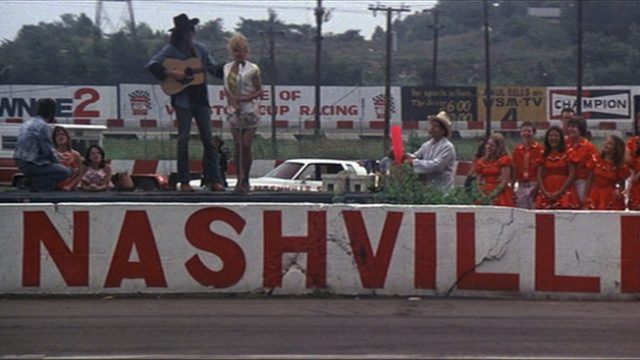By the time Robert Altman broke through with M*A*S*H in 1970, he had been directing for over 20 years, toiling in relative obscurity on industrial films, episodes of Western and detective shows, and the occasional movie. After the massive success of M*A*S*H, he spent the rest of the ’70s cranking out 13 movies over the course of a decade, before the dual failures of HealtH and (especially) Popeye sent him back into the wilderness. These 13 films are notable not just for their eclecticism (covering the horror, Western, noir, science fiction, war, comedy, and musical genres), but for retaining Altman’s unique voice no matter the context. And perhaps no film looms larger in Altman’s ’70s output than Nashville, his 1975 satire of American society in general and the country music industry in particular.
With Nashville, Altman codified many of his stylistic trademarks: the overlapping dialogue, the sprawling ensemble cast, and, most importantly, his potent mix of scathing satire and empathetic sincerity. The former establishes itself early; after a fourth-wall-breaking introduction (another early Altman hallmark) advertising the movie’s own soundtrack album and listing each of the 24 (!) principal actors, Nashville drops the audience into a recording booth, where Haven Hamilton (the great Henry Gibson) is recording “200 Years,” a parody of patriotic country songs like Lee Greenwood’s “God Bless The U.S.A.” so brutal that it’s all but impossible to believe Greenwood’s version came almost a decade after Altman’s. Though it often has the rhythms of a hangout film, Nashville does have a narrative throughline of the days leading up to a rally for populist presidential candidate Hal Phillip Walker, whose pronouncements range from the bizarre (“Does Christmas smell like oranges to you?”) to the ineffectual (a big part of his platform seems to be based on changing the National Anthem), though his plan to eliminate the Electoral College does feel eerily prescient. Released the year after Nixon resigned, the film reflects widespread cynicism towards American society and politics endemic to the cinema of the mid-to-late ’70s.
As hilarious as Nashville often is, what’s most remarkable about it is how much it cares about the people who populate its 160-minute runtime. With nearly two dozen primary characters, Altman and screenwriter Joan Tewkesbury are somehow able to make almost every one of them feel like real people. For instance, Linnea Reese (standout Lily Tomlin, improbably in her first film role) is a gospel singer and mother to two deaf children stuck in a stagnating marriage to local Walker campaign organizer Del Reese (Ned Beatty). When Tom (Keith Carradine), the incredibly talented singer and songwriter for a Peter, Paul, & Mary-style folk trio who’s looking to a. leave his band as quickly and painlessly as possible, and b.have an affair calls Linnea, she Del listens over the phone with no small amount of sadness. Altman, Tewkesbury, and the film’s stacked cast are able to create empathy for these characters without excusing them for their transgressions. When Del invites Sueleen Gay (Gwen Welles), a pretty waitress whose absolute belief in her ability to achieve country-music stardom is only matched by her absolute lack of talent, to sing for a campaign event and then coerces her to strip for the jeering crowd, we register the pain on Sueleen’s face as well as we did on Del’s earlier in the film.
While real country musicians took issue with the film for what they described as mean-spirited parody, Nashville often shows a deep respect for the form. Music unites these characters because it deals with their feelings and circumstances better than any other genre of music could. Barbara Jean (Ronee Blakley), a country music superstar who’s cracking under the harsh gaze of the public eye, says as much in the film’s most painful scene, where she keeps stopping a song before it even starts to tell long, rambling stories about her childhood. Winifred (Barbara Harris), a Dolly Parton-like waitress on the run from her older, uncaring husband, believes she’ll find success in country music — after all, she’s already living a country song. And Altman stops the film cold for Carradine to sing “I’m Easy,” an achingly tender love song. Nashville may be cynical about the music industry itself, but it’s remarkably poignant when observing how music connects and affects people.
That’s the spirit of the film itself — deeply humanistic, but with a bitter eye for how politics and industry distort meaning. It’s there in the film’s famous final scene, where a shocking act of violence leads to the ascension of a new country music star, not through a long history of paying dues, but through luck (talent, in this case, is incidental). As the crowd sings “You may say I ain’t free/But it don’t worry me,” it’s hard not to reflect on how the film is able to sum up its jaundiced view of American society. Altman’s film has endured by taking a sociological view of America in the post-Watergate era, in love with the beautiful, fucked-up people who live in there.


